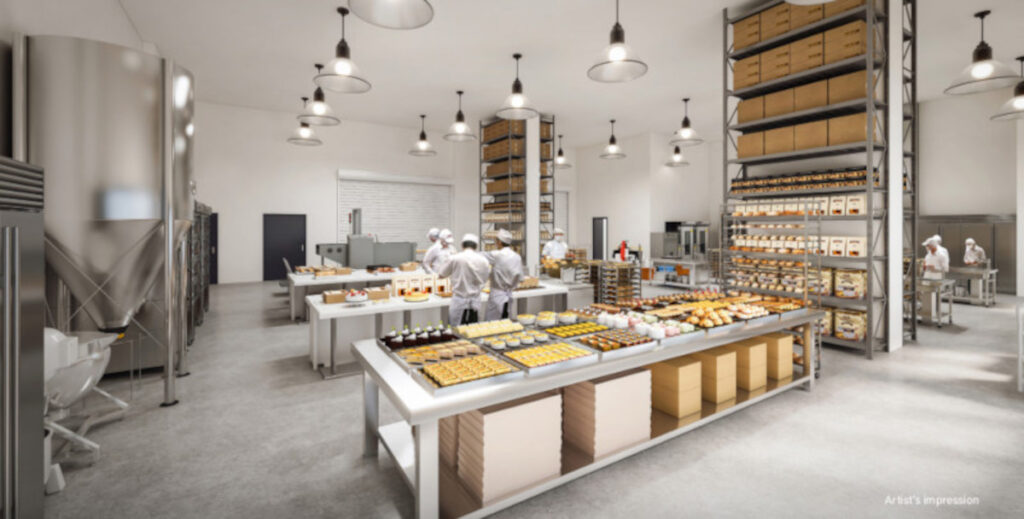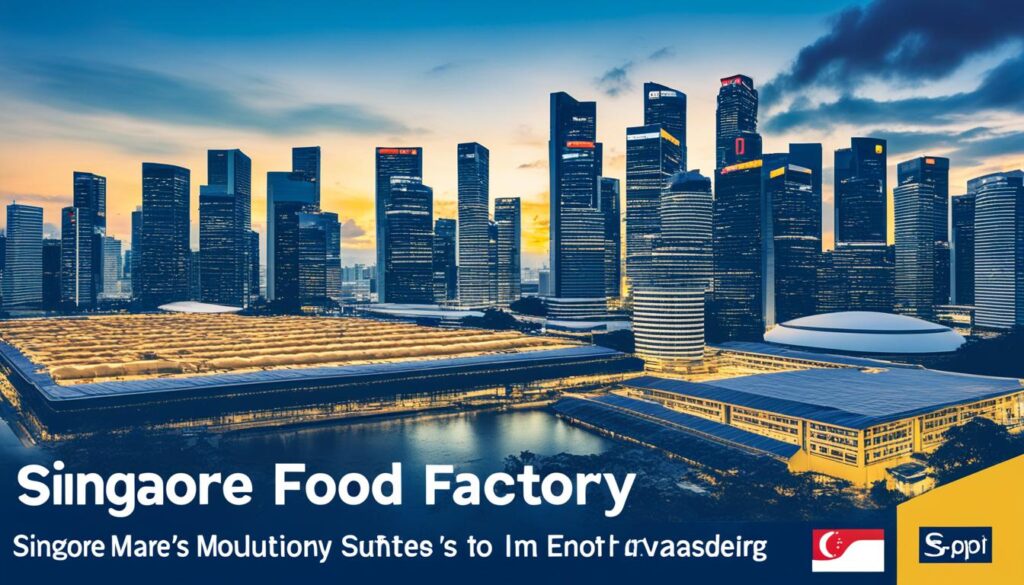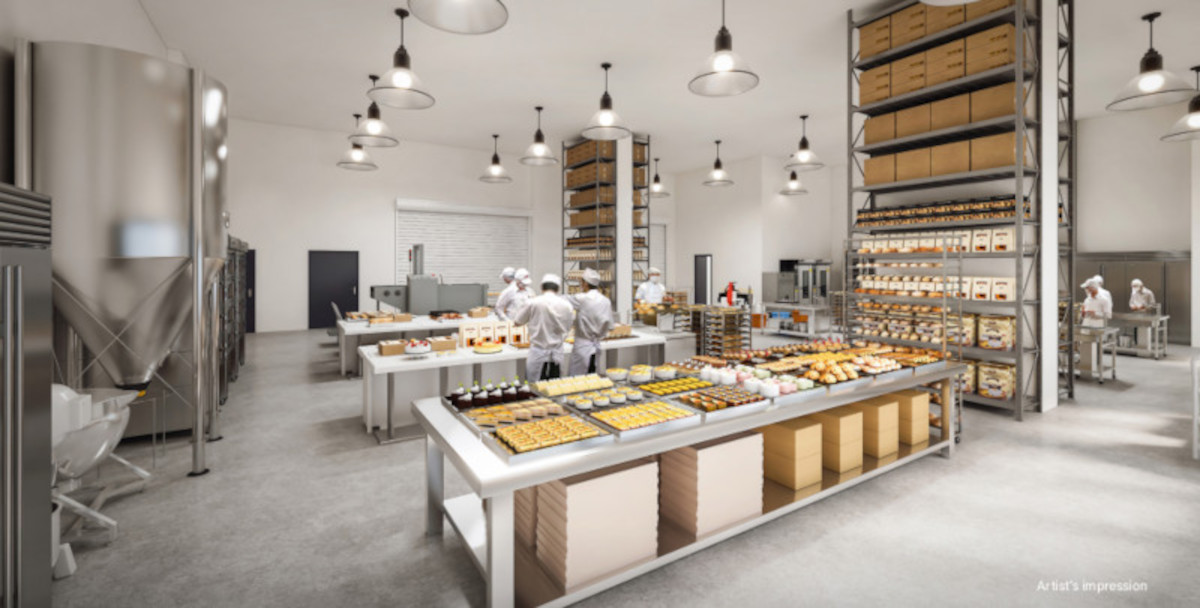Explore the great opportunities for investors in Singapore’s food factory sector. This sector shines because of Singapore’s great location, strong infrastructure, and government support. With Asia’s food industry growing fast, putting money into Singapore’s food factories is a smart choice for those looking to make the most of this booming area.
Key Takeaways:
- Singapore’s strategic location, robust infrastructure, and strong government support make it an ideal market for investing in food factories.
- The rise of food factories in Singapore is driven by the growing demand for high-quality and safe food products.
- The government actively supports the growth of food factories by providing grants, incentives, and a conducive business environment.
- Investing in food factories in Singapore allows investors to tap into the growth potential of Asia’s booming food industry.
- Maximize profitability by evaluating key factors such as target market, market research, and business plan before making investment decisions.
Exploring the Rise of Food Factories in Singapore
In recent years, food factories in Singapore have really grown. This is because more people want high-quality and safe food. These advanced facilities follow strict hygiene rules. This ensures the best food products are made.
Singapore’s food factories are known for their excellent food production. They serve not just the local market but also export abroad. This makes them important in the world food industry. Singapore’s great location and infrastructure help its food manufacturing sector stay competitive.
Food factories in Singapore are all about using the latest technology. They use modern equipment and automation to make their production better. This includes things like advanced food processing machines and modern packaging. All to make sure quality is consistent.
“Singapore’s food factories have become a benchmark for the industry, blending innovation and quality to meet the evolving needs of consumers. With the rise of food factories, Singapore has solidified its position as a leader in the global food market.” – Industry expert
Singapore’s food factories are successful because the city-state is serious about food safety and quality. There are strict rules and checks to keep quality high. These steps protect customers and make Singapore’s food factories well-regarded.
Also, Singapore’s food factories keep looking for ways to get better. They work on research and development to come up with new food products. They want to meet new consumer likes and find sustainable ways to produce food. Innovation keeps them leading in the industry.
The rise of food factories in Singapore such as Food Ascent Food Factory shows its dedication to being the best in food production. With advanced technology and strict quality rules, these factories help the local economy. They also place Singapore as a leading hub in the world for food manufacturing and innovation.

Statistics of Singapore’s Food Factory Industry
| Year | Number of Food Factories | Total Revenue (in SGD) |
|---|---|---|
| 2016 | 120 | 2.1 billion |
| 2017 | 135 | 2.8 billion |
| 2018 | 150 | 3.5 billion |
| 2019 | 168 | 4.2 billion |
| 2020 | 185 | 4.9 billion |
Key Factors to Consider Before Investing in Singapore Food Factories
Investing in Singapore’s food factories can be rewarding. Yet, it demands careful thought and planning. Investors need to weigh critical factors to boost success chances and profit.
Understanding the Target Market
Before investing, it’s vital to understand Singapore’s target market for food. This means looking into what people like, their age groups, and trends. Spotting market gaps and chances is crucial. By doing this, investors can make products that consumers want and do well in this competitive industry.
Conducting Thorough Market Research
Doing detailed market research is key. It means collecting and analyzing info on market size, growth, competition, and what customers do. This lets investors decide on what to sell, how to price it, and how to market it. It guides them to find the market niche they want and plan how to engage their customers.
Developing a Solid Business Plan
For any investment, a solid business plan is essential. Investing in food factories needs a detailed plan. This plan should cover the factory’s running, how much it can make, where it’ll get supplies, where it’ll sell products, and money plans. It should also talk about how to handle risks and adapt to changes in the market.
Consider Key Factors
There are other important things to think about before putting money into Singapore’s food factories. These include the right location, checking if there are enough skilled workers, and looking at possible partnerships. The location affects costs and how easy it is to get supplies and send out products. Having skilled workers ensures good quality and efficient work. Partnerships can improve the supply chain and help reach more customers.

Understanding the Regulatory Landscape for Food Factories in Singapore
Singapore has strict rules for food production to keep food safe and high-quality. The Agri-Food & Veterinary Authority of Singapore (AVA) regulates and licenses food factories. Following these rules is good for consumers, the brand’s image, and stakeholder trust.
Ensuring Food Safety Standards
Food factories in Singapore work hard to meet top food safety standards. They must keep clean, use proper sanitation, and check product quality often. The AVA checks factories regularly to make sure they follow the rules.
“Singapore focuses a lot on food safety, making it a trusted place for food production. Following the AVA’s rules means food factories can make sure their products are safe, reliable, and meet consumer needs.”
Licensing and Registration Process
The AVA is key to the licensing and registration of food factories. Before starting, factories need the right licenses and permits from the AVA. These need regular updates to keep quality up.
AVA’s inspections and audits check if food factories meet standards. They look at how raw materials, manufacturing, storage, and distribution are handled. They also make sure food labeling follows the rules.
Collaboration and Compliance
The AVA helps food factories stay on track with rules. They run sessions, training, and education on food safety. This improves operations.
Factories are urged to use best practices like the HACCP systems. This helps find and manage food production risks.

In Summary
For Singapore’s food factories, knowing and following the rules is key. Sticking to safety standards is good for consumer trust and the brand. Working with the AVA helps factories remain compliant, excel, and keep Singapore’s food reputation strong.
Evaluating the Profitability of Investing in Singapore Food Factories
Investing in food factories needs a look at several key factors. These include production costs, market demand, competition, and scalability. Understanding these elements helps investors make wise decisions and earn more.
Singapore’s strong infrastructure and efficient supply chain boost food factories’ success. These advantages enable smooth operations and wide distribution. This reduces costs and raises profits. Plus, Singapore’s location helps reach more customers internationally.
To lead in the food industry, using the latest technology is crucial. Automation is key as it makes processes faster, cuts labor costs, and improves efficiency. This helps food factories work better, make high-quality products, and increase profits.
Also, being sustainable matters a lot today. People want food that’s made responsibly and is good for the environment. Food factories that adopt green methods can attract these buyers. This can grow their market share and profit.
“Investing in food factories can be a lucrative venture if key factors such as production costs, market demand, competition, and scalability are thoroughly evaluated. By leveraging Singapore’s robust infrastructure, efficient supply chain, advanced technologies, and sustainable practices, investors can enhance profitability and capitalize on the opportunities in the food industry.”
To wrap up, Singapore’s food factories are an exciting investment opportunity. But, understanding production costs, market needs, competition, and scalability is key. Using Singapore’s strong infrastructure, efficient supply chain, new technologies, and green practices can help boost profits. With smart strategies, investors can succeed in Singapore’s booming food industry.

Case Studies: Successful Investors in Singapore’s Food Factory Sector
Looking at successful investors in Singapore’s food factory sector shows us valuable lessons and hope. Many companies have done well in this field because of Singapore’s good business climate, helpful government policies, and strong consumer demand.
Noble Foods Group
“Our decision to invest here was due to Singapore’s key location and lively business scene. Its great business environment, with top-notch infrastructure and skilled people, gave us a strong base to grow.”
Noble Foods Group, a leader in food processing and distribution, saw big potential in Singapore’s food sector. They aimed to meet Asia’s rising demand for quality food. By using Singapore’s excellent business climate, Noble Foods Group built a top-notch food processing plant. This plant meets strict quality and safety standards.
They invested in modern technology and green practices. This has kept them ahead in the market and made them a top choice for customers everywhere.
Prime Foods International
“Singapore’s top-notch food production and supportive business setting influenced our investment choice. We’ve grown a lot in both local and export markets, making us a key player in the sector.”
Prime Foods International, known for its food manufacturing, saw an opportunity in Singapore’s food sector. They embraced the city’s helpful business climate. Their investment in new facilities and advanced tech let them produce many high-quality food items.
Thanks to Singapore’s strong regulations and good logistics, Prime Foods International can supply products everywhere. Their focus on sustainability and innovation has made them a reliable industry partner.
These stories of success in Singapore’s food factory sector are enlightening. By making the most of Singapore’s welcoming business environment, these firms have grown and become well-known in the industry. Their journeys offer motivation for potential investors, showing the great possibilities in Singapore’s booming food sector.
Overcoming Challenges: Tips for Managing and Scaling Food Factories in Singapore
Running food factories in Singapore comes with hurdles, from skilled labor to supply chain issues. Here are strategies for success:
1. Developing a Skilled Workforce Pipeline
Smooth operations need skilled workers. Partner with schools and training centers to build a talent pipeline. Offer apprenticeship and training to draw in and keep talent. Keep your team growing with ongoing learning chances. This enhances their skills and job happiness.
2. Embracing Technological Advancements
Technology is vital for efficient factory management. Invest in new machinery and digital tools to boost efficiency and cut costs. Use real-time tracking for inventory and quality control. Technology helps you stay competitive by increasing productivity and reducing mistakes.
3. Fostering Innovation
Being innovative keeps you ahead in the food industry. Encourage your team to try new ideas and products. A culture of innovation lets you improve and create standout items. Connect with customers and experts for insights and fresh ideas.
4. Regularly Updating Business Strategies
The market and tastes change often. Keep your strategies fresh to stay competitive. Research and track trends to find new opportunities. Staying agile helps you make smart moves and meet customer needs.
“In managing and scaling food factories in Singapore, it’s important to address the challenges holistically. By investing in developing a skilled workforce, embracing technology, fostering innovation, and consistently updating business strategies, food factories can overcome obstacles and thrive in this dynamic industry.”
These strategies make managing and expanding food factories in Singapore smoother. Tackling labor and supply chain challenges leads to better productivity and growth.
| Challenge | Tips for Overcoming |
|---|---|
| Availability of Skilled Labor | 1. Collaborate with educational institutions 2. Offer apprenticeship programs and internships 3. Provide continuous learning and development opportunities |
| Efficient Supply Chain Management | 1. Leverage technology for real-time monitoring 2. Optimize inventory management 3. Streamline logistics and distribution processes |
Directly facing these challenges with strategic solutions empowers Singapore’s food factories. This maximizes their impact on the regional food industry’s growth.
Future Trends and Opportunities in Singapore’s Food Factory Industry
Singapore’s food factory industry is poised for growth and innovation. As people prefer sustainable and plant-based foods, investing in these areas can give food factories an edge. Innovative, green production methods can fulfill the demand for healthy, eco-friendly options.
The rise of e-commerce and online food delivery is changing the food industry. These platforms offer convenience and are becoming popular. Food factories can use digital marketing to build an online presence and reach more customers.
“By investing in sustainable practices and seeking out new ingredients, food factories can lead the industry. Integrating sustainability into operations attracts eco-conscious customers and builds a greener future.”
Teaching customers about sustainable foods can boost a brand’s reputation and loyalty. Food factories can highlight benefits like lower carbon emissions and supporting local farms to appeal to conscious buyers.
The food industry’s evolution offers chances for teamwork with research bodies and universities. This collaboration can lead to innovation and new products. It allows food factories early access to the latest research and technology.
Opportunities for Growth and Expansion
The food factory sector in Singapore faces many growth and expansion opportunities. By focusing on sustainability, digital marketing, and innovation, they can become market leaders.
Table: Future Trends and Opportunities
| Trend/Opportunity | Description |
|---|---|
| Growing Demand for Sustainable Food Products | Environmental awareness boosts the demand for sustainable food products. |
| Rise of E-commerce and Online Food Delivery Platforms | Online platforms’ convenience helps reach new customers and expand the market. |
| Investment in Digital Marketing | Creating a strong online presence and engaging customers through digital channels. |
| Collaboration with Research Institutes and Universities | Working with academics to fuel innovation, research, and development. |
By leveraging these trends and opportunities, food factories in Singapore can excel, meeting demands while pushing for sustainability and innovation.
Unleashing the Potential of Singapore Food Factories for Savvy Investors
Singapore’s food factory industry is booming, and savvy investors know it. The city-state’s excellent infrastructure, supportive policies, and strong consumer demand make it attractive. Its strategic location and advanced logistics open doors to Asia’s vast food market. Smart investors consider several key factors when exploring the potential of Singapore food factories.
Robust Infrastructure: Singapore has world-class facilities ensuring smooth operations in food production. Ports, transportation systems, and technology enable efficient import and export. This means food factories can easily get raw materials and reach markets worldwide, boosting their business.
Supportive Government Policies: The government of Singapore wants the food industry to grow. It offers incentives, grants, and financial help for tech adoption and training. This supportive environment encourages innovation, making Singapore a great place for food factory investments.
Strong Consumer Demand: Singaporeans value quality, safety, and traceability in their food. They prefer locally produced items that meet high standards. Investors that meet these standards enter a market ready for growth, driven by health and eco-friendliness.
Investing in Singapore food factories means knowing the industry well and evaluating market trends. Following regulations, using Singapore’s infrastructure, and keeping up with trends helps investors do well. The food industry in Singapore promises high profits and exciting opportunities for those ready to dive in.
To succeed, investors should utilize Singapore’s top infrastructure and supportive government. This industry is full of chances for growth, innovation, and making money. Effective management and understanding market trends are key. This could lead investors to success in Asia’s bustling food market.
Conclusion
Investing in a food factory in Singapore is a great chance to make money in Asia’s food industry. It has good infrastructure, helpful government policies, and strong demand from shoppers. Yet, to be successful, one must thoroughly check key factors and follow rules.
Doing detailed market research and knowing your audience is key. Also, having a strong business plan is crucial. This way, investors can do well in Singapore’s competitive food industry. They should also keep up with trends, use new technologies, and practice sustainability to be more efficient and profitable.
Singapore’s business-friendly atmosphere and high standards make it a smart choice for investment. It not only brings financial gains but also access to global markets. Smart investors can really benefit and help Singapore’s Food Factory sector grow and innovate.
FAQ
What makes Singapore an ideal market for investing in food factories?
Singapore’s location, infrastructure, and government support contribute to its appeal for food factory investment. The growing need for quality, safe food products fuels the food factory boom here. Grants, incentives, and a supportive business climate are provided by the government to nurture this growth.
What sets Singapore’s food factories apart?
State-of-the-art tech and high hygiene standards are key factors that set Singapore’s food factories apart. They supply both local and overseas markets, benefiting from Singapore’s reputation for quality.
What factors should I consider before investing in Singapore’s food factories?
Knowing your market, doing your research, and having a good plan are important before investing. Consider the site, labor skills, and building relationships with suppliers and distributors as well.
How are food factories regulated in Singapore?
Singapore enforces strict food production standards for safety and quality. The Agri-Food & Veterinary Authority (AVA) oversees this regulation. Following these rules boosts consumer trust and improves brand image.
How can investing in food factories be profitable?
Profitability comes from understanding costs, demand, competition, and scaling potential. Singapore’s efficient infrastructure and tech use can cut costs and boost profits. Keeping costs down and adopting eco-friendly methods also helps.
Are there any successful investors in Singapore’s food factory sector?
Yes, many companies have succeeded in Singapore’s food factory sector by tapping into the supportive business climate and strong demand. Their stories offer useful lessons and encouragement for new investors.
What challenges are involved in managing and scaling food factories in Singapore?
Finding skilled workers and managing the supply chain are big challenges. Partnerships with schools and embracing tech can help overcome these issues. Staying innovative and up-to-date with market trends is essential for growth.
What future trends and opportunities can we expect in Singapore’s food factory industry?
The demand for sustainable and plant-based foods is growing. Innovation and eco-friendly methods could set companies apart. E-commerce and online delivery also open new avenues for reaching customers.
Why should savvy investors consider investing in Singapore food factories?
Singapore’s food industry is ripe for investment, thanks to its strong infrastructure and consumer demand. Staying compliant and ahead of trends is vital for success and profitability here.






